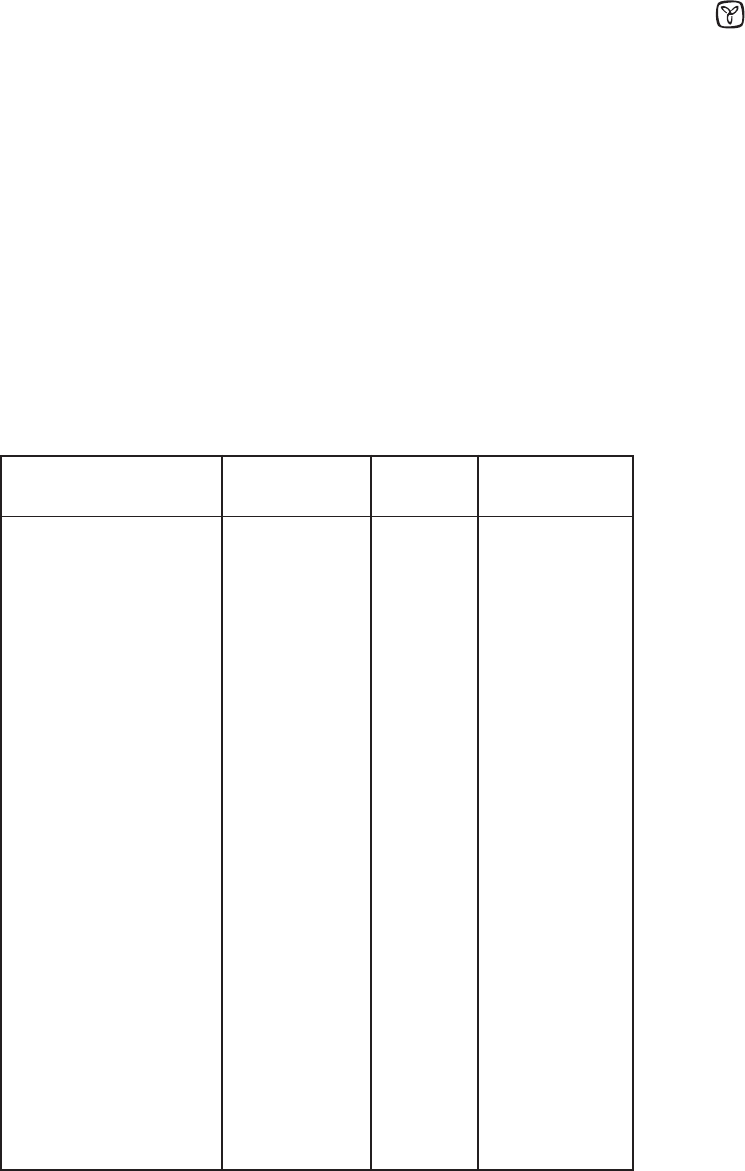
7
The air inside the oven is heated by the element around
the fan situated behind the back panel. The fan circulates
hot air to maintain an even temperature inside the oven.
The advantages of cooking with this function are:
•
Faster Preheating
As the fan oven quickly reaches temperature, it is
not usually necessary to preheat the oven although
you may find that you need to allow an extra 5-7
minutes on cooking times. For recipes which
require higher temperatures, best results are
achieved if the oven is preheated first, e.g. bread,
pastries, scones, souffles, etc.
• Lower Temperatures
Fan oven cooking generally requires lower
temperatures than conventional cooking.
Follow the temperatures recommended in the
cooking chart. Remember to reduce temperatures by
about 20-25°C for your own recipes which use
conventional cooking.
Using the Fan Oven
This chart is intended as a guide only. It may be necessary to increase or decrease the temperature to suit your
individual requirements. Only experience will enable you to determine the correct setting for your personal requirements.
Cooking Chart
• Even Heating for Baking
The fan oven has uniform heating on all shelf
positions. This means that batches of the same
food can be cooked in the oven at the same time.
However, the top shelf may brown slightly quicker
than the lower one. This is quite usual. There is no
mixing of flavours between dishes.
How to Use the Fan Oven
1. Turn the oven function control knob to .
2. Turn the thermostat control to the required
temperature.
THINGS TO NOTE
• The oven light will come on when the oven function
control knob is set.
• The thermostat control light will remain on until the
correct temperature is reached. It will then cycle on
and off to show that the temperature is being
maintained.
Shelf positions
are not critical
but ensure that
oven shelves
are evenly
spaced when
more than one
is used.
Food Shelf Cooking Cooking
Position Temp (°C) Time (minutes)
Biscuits 180 - 190 10 - 20
Bread 210 - 220 25 - 30
Casseroles 130 - 140 2½ - 3 h.
Cakes:
- Small and queen 160-170 18 - 25
- Sponges 160 - 170 18 - 20
- Madeira 140 - 150 1¼ - 1½ h.
- Rich Fruit 130 - 140 2¼ - 2½ h.
- Christmas 130 - 140 3 - 4½ h.
- Meringues 90 - 100 2½ - 3 h.
Fish 170 - 190 20 - 30
Fruit Pies and Crumbles 190 - 200 40 - 50
Milk Puddings 130 - 140 1½ - 2 h.
Pastry:
- Choux 190 - 200 30 - 35
- Shortcrust 190 - 200 15 - 20
- Flaky 190 - 200 25 - 40
- Puff 210 - 220 25 - 40
Plate Tarts 180 25 - 45
Quiches/Flans 180 - 210 25 - 45
Scones 210 - 220 8 - 10
Roasting:
Meat & Poultry 160 - 180 see roasting
chart
}


















